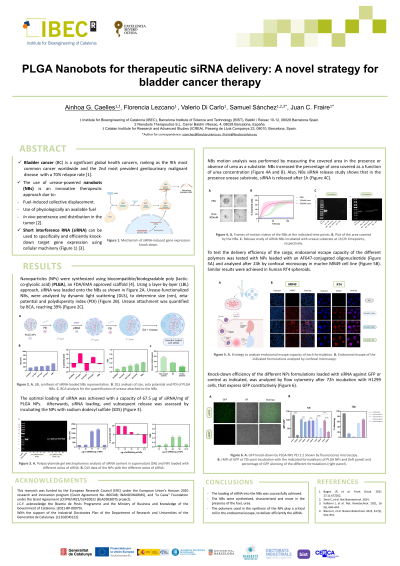Nanomedicine and Nanoscale Delivery (Focus Group - NND)
(302) PLGA Nanobots for therapeutic siRNA delivery: A novel strategy for bladder cancer therapy

Introduction: Bladder cancer (BC) is a significant health issue, and treatments like surgery, chemotherapy, and Bacille Calmette-Guérin immunotherapy have limitations, emphasizing the need for new strategies1. Gene therapy, particularly small interfering RNA (siRNA), offers targeted gene silencing but faces challenges like poor cellular uptake and lysosomal degradation, requiring better carriers2. Enzyme-powered nanoparticles, nanobots (NBs), which self-propel via substrate catalysis, are versatile tools for nucleic acid delivery3. This study evaluates urease-NBs for delivering therapeutic siRNAs in BC.
Learning Objectives:
- What is a Nanobot, and the differences/advantages compared with a conventional nanoparticle.
- Which targets were selected to design the siRNAs and why?
- Which are the next steps to keep developing this new approach for bladder cancer treatment?
Valerio Di Carlo – Senior technician, Institut de Bioenginyeria de Catalunya; Florencia Lezcano – Post-doc, Institut de Bioenginyeria de Catalunya; Samuel Sánchez – Principal investigator, Institut de Bioenginyeria de Catalunya; Juan Fraire – Senior Researcher, Institut de Bioenginyeria de Catalunya

Ainhoa González Caelles, MSc (she/her/hers)
PhD student
Institut de Bioenginyeria de Catalunya (IBEC) and Nanobots Therapeutics, Catalonia, Spain

